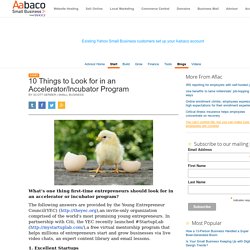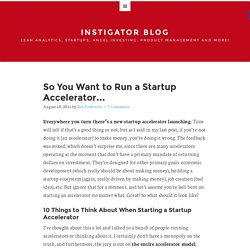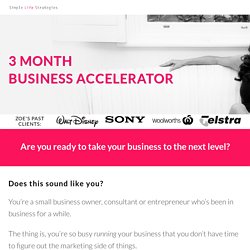

What to Look for in an Accelerator Program. This story first appeared in the January 2013 issue of Entrepreneur.

To receive the magazine, click here to subscribe. When Chris Bergman entered startup accelerator The Brandery in 2011, he wasn't sure exactly what the program would be able to accomplish for his company. "I was a skeptic. My hope was that if it taught me something about how to raise money, that would be good enough," says Bergman, co-founder and CEO of Choremonster, which has developed an app to reward kids for helping out around the house. Roughly one year and $775,000 in funding later, Bergman is still reaping rewards, financial and otherwise, from his three-month stint with the Cincinnati accelerator. Startup accelerator programs are popping up every day, available to a wider range of entrepreneurs than ever before. While most accelerators provide tangibles such as funding, mentorship and access to potential investors, they're not a golden ticket to success.
The same is true at the end of the program, on Demo Day. 10 Things to Look for in an Accelerator/Incubator Program. What’s one thing first-time entrepreneurs should look for in an accelerator or incubator program?

The following answers are provided by the Young Entrepreneur Council(YEC) ( invite-only organization comprised of the world's most promising young entrepreneurs. In partnership with Citi, the YEC recently launched #StartupLab ( free virtual mentorship program that helps millions of entrepreneurs start and grow businesses via live video chats, an expert content library and email lessons. 1. Excellent Startups The quality of your accelerator class will have a larger impact on your startup than the investors and mentors in the program. So You Want to Run a Startup Accelerator… Everywhere you turn there’s a new startup accelerator launching.

Time will tell if that’s a good thing or not, but as I said in my last post, if you’re not doing it [an accelerator] to make money, you’re doing it wrong. The feedback was mixed, which doesn’t surprise me, since there are many accelerators operating at the moment that don’t have a primary mandate of returning dollars on investment. They’re designed for other primary goals: economic development (which really should be about making money), building a startup ecosystem (again, really driven by making money), job creation (bad idea), etc. But ignore that for a moment, and let’s assume you’re hell bent on starting an accelerator no matter what.
Great! 10 Things to Think About When Starting a Startup Accelerator I’ve thought about this a lot and talked to a bunch of people running accelerators or thinking about it. First and foremost I’ll say this – all accelerators are not the same. Who runs the accelerator? The Pros and Cons of Startup Accelerators. A startup accelerator is built to foster rapid growth of its portfolio companies.

It's a man-made perfect storm of mentorship, access to technology, office space and an innovative community, packed into a short time frame. Essentially, the function of an accelerator is to turn the art of starting a company into a program that can be repeated, churning out valuable companies as if on an assembly line. While each accelerator has nuances, programs tend to share several traits: Startups apply to be part of a program lasting a few months, in which they obtain mentorship, office space and funding, usually in exchange for company stock. The accelerator program hopes to enable exciting new businesses and of course get a return on the investment.
For Y Combinator (YC), the original accelerator, that vision seems to have worked. Now, the concept of an accelerator itself is being repeated, with everyone from Chile to Nike launching their own version of the program. Simple Life Strategies. Zoë B is an established Business & Marketing strategist helping small businesses to grow exponentially.

Zoë 's 14 year career in Marketing saw her initially working for global Advertising Agencies in London and Sydney for 7 years. In 2007 she founded her own 7 figure marketing business building strategic & creative solutions for global corporate brands such as Unilever, Sony, Disney, Telstra & Paramount Pictures. Zoë saw a need for small businesses to learn the strategic practices that multinational corporations use for long-term success, and created the 3 month Business Accelerator in response to this demand. Zoë is also passionate about helping smart professionals change careers and founded the Simplelifestrategies.com blog in 2012. This blog attracts more than 15,000 people from all over the world who are looking to define 'successful living' on their own terms. 13 things tech founders should look for in an incubator or accelerator. Tech founders stand to benefit enormously from the support, mentorship and even capital an accelerator can provide, and not surprisingly, many top accelerators and incubators are inundated with applications.

But not all are made equal. When looking for the right incubator or accelerator, you need to think long term. To learn more, I asked 13 entrepreneurs from Young Entrepreneur Council (YEC) what founders should look for. Their best answers are below. Specific value add and network The two biggest things accelerators can give you are access to a powerful network and specific free or improved business services or advantages. . — Brennan White, Cortex A collaborative environment Some of your best allies will be other tech founders. . — Michael Mayernick, Spinnakr Graduates’ funding and valuation The most important thing to consider is the success and value of the companies that have gone through the accelerator or incubator.